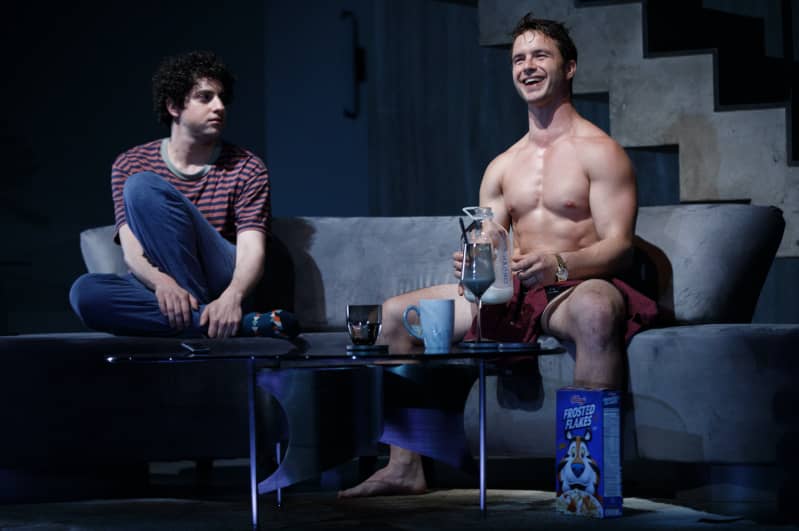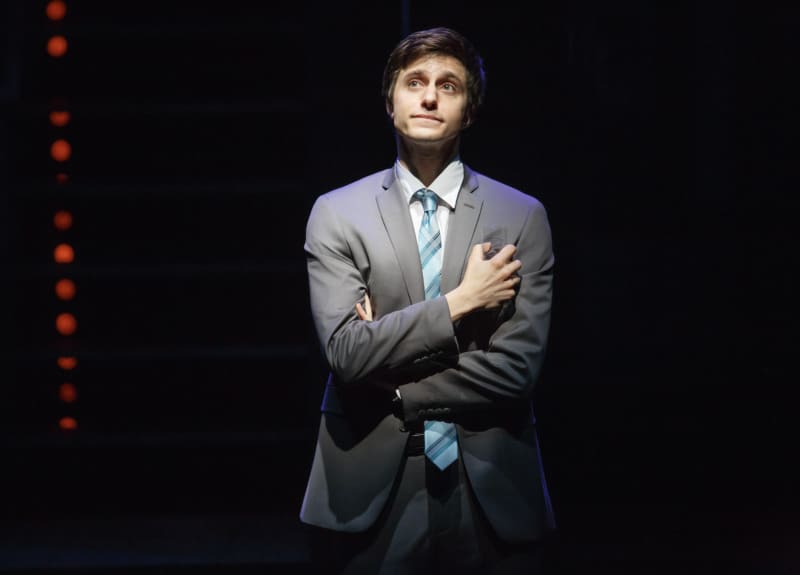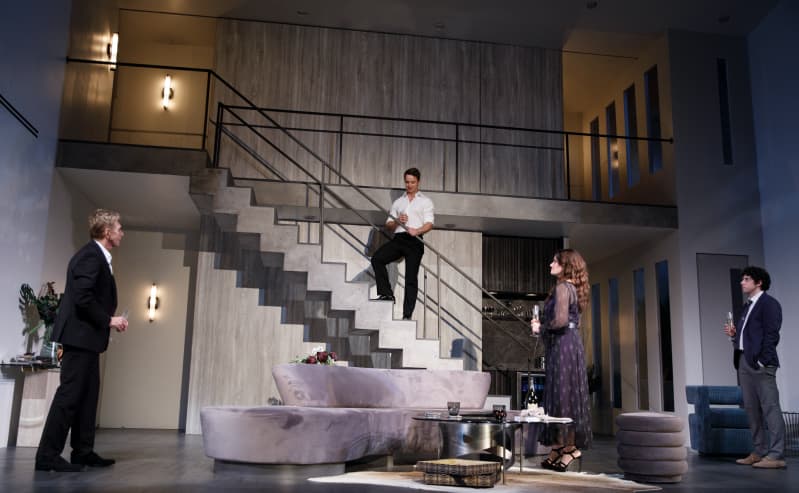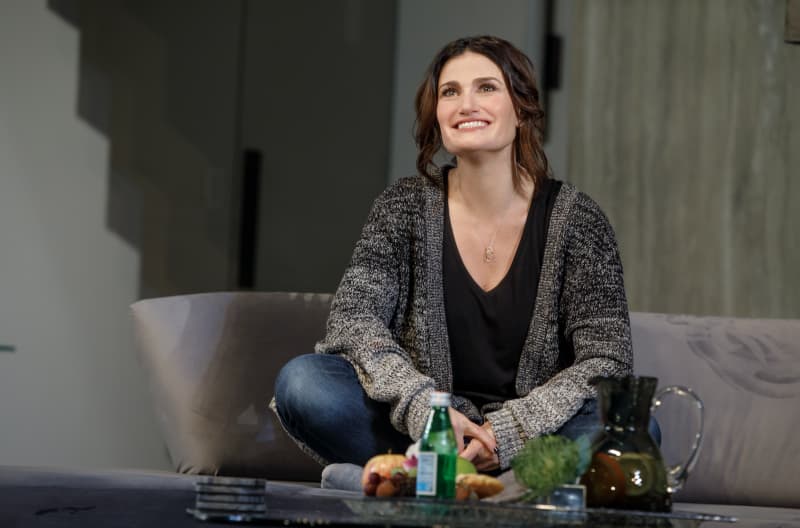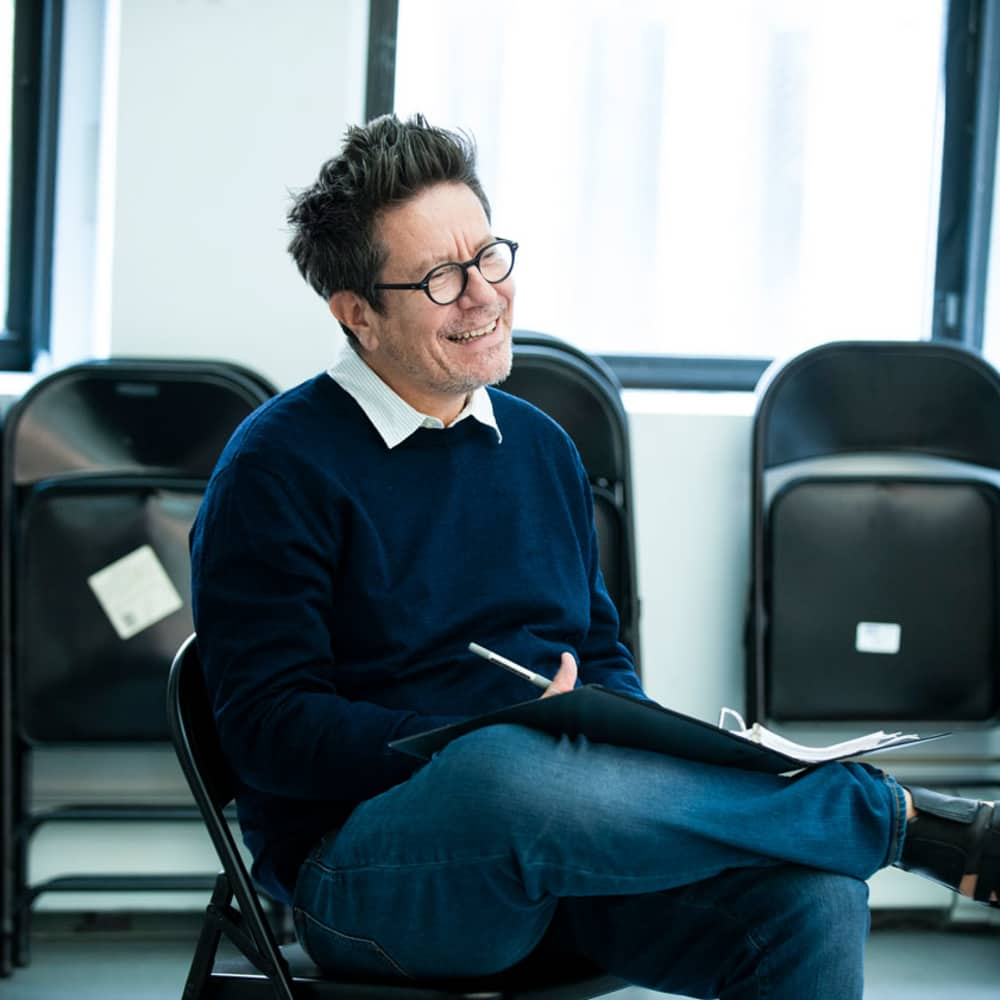Skintight:
A Conversation With Playwright Joshua Harmon
Posted on: June 28, 2018
On June 16, 2018, Joshua Harmon spoke about Skintight with education dramaturg Ted Sod as part of Roundabout Theatre Company's lecture series.
Ted Sod: Skintight was commissioned by Roundabout and it was your first commission. You were also commissioned by Lincoln Center to write Admissions -- which just won the Drama Desk Award this season as best new play. Will you tell the audience how the commission process works for Roundabout Underground writers?
Joshua Harmon: What's amazing about the Roundabout is that they have the basement space, the Underground, which is where they produce writers who have never been produced professionally in New York. And when you get that production -- which for every writer is the biggest production of their life -- Roundabout simultaneously says, “We're also going to commission you to write another play!” Roundabout throws you a lifeline and they say, “Keep writing and here's some money to do it.” The commission to write Skintight came in 2012 after my play Bad Jews was produced in the Underground space and here we are six years later.
TS: I want to ask you about the genesis of the characters for this play. These are very specific characters.
JH: Yes, they're very specific. I really wanted to write a play about what it's like to be young while I was still technically young. I think a lot of times those stories get told with a backward glance. It is usually somebody older looking back and remembering their younger years through the lens of nostalgia. I was interested in trying to understand why so many people are obsessed with youth. I didn't particularly like being young. It was a tough time. And I somehow understood I would be happier as I got older. So, I started with the question: why is everybody around me so obsessed with youth? But that's just a theme. I ultimately found my way to this family and I realized I could take that thematic question and make it incredibly personal for the people in the play. That’s when it became something I got really excited about writing.
TS: Your arguments are always so balanced, which is what I really love about your writing. I'm 67. I don't wake up “smelling death on myself” like Elliot does, yet. I do get seeing the end is around the corner. And I get what he’s talking about when he talks about his love for Trey. I also get what his daughter Jodi means when she says, “You can’t call this love, it’s lust.” Can you talk about how at 35, you understand that so beautifully?
JH: I tend to try to write about subjects that I don't fully understand. I like to write about things I can see from multiple points of view. It's always more exciting when you land on something you can look at from this angle and that angle and be able to articulate valid reasons why each perspective has validity. There are certain subjects I know I would not write well about because I know exactly how I feel about them. I would struggle to write a play about abortion because I know how I feel about it. And I wouldn’t do it well. It's always better when you find a subject that you're just not sure about and which you really could be swayed in multiple directions about. And then you have the freedom to see what it feels like to investigate multiple perspectives.
TS: One of the other things that I truly appreciate about this particular play is the two 20-year-olds. They couldn't be more different. They're polar opposites. Can you talk a bit about that dynamic and how you found your way into that?
JH: I think a lot of people have an immediate understanding of who Trey is and who Benji is when they come onto the stage. Benji comes off as spoiled and he's not cool. And so, what becomes exciting about the writing of the play is revealing new aspects or facets of who these people are, so that the audience’s initial judgment becomes something they have to question. It's exciting to feel confused by people throughout the play, to find them really charming in one moment and then really ugly the next. Because I think that's how most people are. There's just a bandwidth that people live inside and bounce around in. It's more interesting if characters are ambiguous.
TS: I found the scene with Trey and Benjamin on the sofa hysterical because you can see Benji yearns for that kind of lust fulfillment. I think it puts some people in the audience on edge. Did you know that was going to happen in that scene? Because I didn't necessarily see all the depth of what is going on, when I read it. Was that always in your mind when you wrote it?
JH: I never know what was in my mind. It was exciting to find it in rehearsal. It became clear that we had two great actors and that they were finding the rhythm of that scene. And one of the reasons to write something with a comic point of view, I think, is not just to make it funny. If it is funny, it actually makes it more palatable for an audience to enter into territory that might be challenging otherwise.
TS: I also love the way you write intergenerational relationships. I'm thinking back on Significant Other, which we did here, and that gorgeous relationship between Jordan and his grandmother, Helene. You’ve written a more troubled relationship between Benji and his grandfather and between Jodi and her father in this play. I'm curious how you came about understanding those intergenerational relationships? Is it from acute observation?
JH: It's a lot of observation. And just listening to people and, also, I think one of the things I've learned working on this play, which might be obvious to all of you, is the idea that relationships – no matter what generation -- aren't linear, especially in families. It's not a straight line. It's more like being in a washing machine where you're sometimes up on this side and then you're repelled and then you come back and then somebody compels you to come over here. Relationships are not even circular. You're moving through time but you're tossed around like clothes in a washer or a dryer. There's an element of love among all of the people in the play and there’s fury and anger at the inability to connect. And then there are moments of connection. To me, that feels very real. It's exciting trying to put that on stage.
TS: I want to talk about the domestics. Can you talk a bit about finding those characters?
JH: I wrote the first draft of the play five years ago, so there have been many drafts, and in the first three or four there were no domestics. Daniel Aukin, the director, explained to me that domestics would have to be part of a household like this. I don’t come from this world -- he doesn't either -- but he knew more about it than I did and he said, “A person like Elliot doesn't open his front door, that's how this kind of wealth works.” And then it became a question of do I put the domestics on the stage? I thought we should actually see them because it shows his power and his wealth and the kind of world this is. Then it was about figuring out how to make them essential to the story, so that they weren't just peripheral but served a real function. When I first thought of making Orsolya a Hungarian -- because this is a family with Hungarian roots -- that was something very exciting to me -- in terms of thinking about immigration and the American experience. And then with Jeff, the butler/valet, he became a ghost of Christmas past, a warning for the character of Trey.
TS: Trey is so mean to Jeff, because he seems so threatened by the fact that Jeff and Elliot were lovers once upon a time. Both gay men are extremely threatened by the idea that somebody else might find their love attractive. I know that exists in straight relationships, too. Is that something you experienced in your observation of people?
JH: There was somebody I met who had a lot of knowledge about guys like Trey who were in those types of relationships. I did ask him a lot of questions. And one of the things he said, which I found interesting, was how much jealousy the older partner had about his young lover, especially when it came to the use of technology. “What are you doing on your phone? Who are you talking to or texting?” And that detail proved useful to me in laying the groundwork of their relationship. But you know, they're also the only couple that we see onstage, so I don't know if it's a general statement about gay men and their jealousy.
TS: I also have noticed that the theme of loneliness is in the three plays that we've produced. I felt Daphna in Bad Jews was a tremendously lonely human. And Jordan I think was quite lonely on some levels. Helene was too, but they had each other. And now Jodi and her son Benjamin, to a certain extent, they seem terrified that they'll be alone. Can you talk a bit about your understanding of that?
JH: I think Jodi is in mid free fall right now and she's hitting every branch of the tree on her way down. Her father is the last limb that she can hold onto before she comes crashing to the ground. She's vulnerable and that vulnerability opens her up to feeling more and to lashing out. But, yes, I guess that is a theme in the plays. I hadn't put that together. I think you're right.
TS: Even in a free fall, Jodi’s able to be very funny.
JH: It's a survival tactic, and you get a sense that she will land on her feet, she will be okay. But her life a year ago was very different and she is trying to build a new life, which she didn't think she'd have to do.
TS: When I interviewed you for the playgoers guide and I asked if you had to do a lot of research in order to write this play, you said, “No, not really, but I watched A Streetcar Named Desire over and over and over and over.” When I started to analyze that, I thought, is it because Blanche is an interloper and Trey is an interloper? How did that feed you?
JH: It's good to look at the great plays for inspiration. And Streetcar on one level is a turf war between Blanche and Stanley for Stella's heart. Stella is torn between her familial obligations to her sister, Blanche, and her desire for her husband, Stanley. When I started to understand that, it became a very helpful guide as I rewrote the play to think about the little things that you fight over in a turf war, because in Streetcar, the prize is Stella and in this case, it's Elliot.
TS: Were there other plays that you used for inspiration?
JH: I also thought a lot about The Heiress, which is based on the Henry James novel. I thought about it because it was a play that I saw as a young kid and some of the plays you see as a young person impact you in a giant way. It's a play I thought about a lot because Morris is a character who makes you ask yourself, “Is he there for the right reasons, is he trying to marry this woman for her money? If he is, is that such a bad thing? Her father doesn't think very highly of him – but he also doesn’t think highly of his daughter, so why would it be bad?” It poses a lot of the same questions I pose about Trey and it was useful to look at it as a guide.
TS: Elliot seems to have moved further and further away from his Hungarian-Jewish roots and his grandson, Benjamin, wants to know more about it. Was that something you experienced yourself?
JH: Somewhat, yes. It feels very American to me. The generation that Elliot comes from shrugged off the things that made you un-American. And that was the price you had to pay to enter American society. Elliot is a person who did that. And now his grandson has the privilege of being able to try and go backwards, in part because of his grandfather's success at shrugging it off. But I think his grandson feels an obligation or a sense that if he doesn't do this, then it's shrugged off for good. There is something thrilling to me about the idea of this person whose parents and grandparents left Hungary many years ago, going back and opening a store there and then his grandson paying to study abroad there. I love how weird that is.
Audience Question #1: I am interested in Trey's hostility toward Jeff. Was that because he isn't used to dealing with servants? Do you think he somehow picked up that Jeff and Elliot had a history together?
JH: I think Trey is definitely aware of the history and doesn't like that potential threat in the house. It’s also meant to be an examination of class. How do people find their way into different roles, how do people rise up in station and what happens on the way up. And then what happens on the way down.
Audience Question #2: Did you consider developing the character of Grayson – Jodi’s other son -- did he ever appear in prior drafts?
JH: I really enjoy offstage characters, so you get two or three details about Grayson and you can fill in the rest. But Jodi describes him as her nightmare child and there's not much you learn about him that doesn't dispel you of that idea.
Audience Question #3: I found the staircase really interesting. I found it to be another character -- did you always think there would be a staircase when you wrote the play or did you add it after?
JH: I love that you ask that and I love the staircase. A favorite writer of mine is Alfred Uhry, who talked about when he watched a scene in Wendy Wasserstein’s The Sisters Rosensweig, he was so taken with the staircase, because people could have these great exit lines and then storm up the stairs. And then he did that with his play, The Last Night at Ballyhoo, and that was just something that had always stayed with me, that could be really fun.
Audience Question #4: Elliot doesn’t want to see Grandma Sofia because he's basically embarrassed to, probably because she only sees him as being gay -- correct? But Benjamin goes and gets treated similarly. Was Elliot trying to spare Benji from that embarrassment when he says, “Don’t visit her!”?
JH: Possibly. I think the culture Elliot grew up in is a very different culture than the one Benji got to grow up in. And the threat of that word “fagele” presented a lot more challenges for somebody in Elliot's time than it does for Benji – that moment is meant to speak to that generational change.
Audience Question #5: Congratulations, Josh, on a great play. I was interested in your choice of the fashion industry. I kept thinking of names like Calvin Klein and Marc Jacobs. Were you automatically drawn to fashion for Elliot’s character?
JH: I was drawn to fashion because I wanted to write about the thematic ideas of beauty and make them really mean something to the people onstage, so that it wasn't just an idea. There is a whole group of Jewish moguls in other industries too that I thought about. Like David Geffen and Barry Diller. But I kept coming back to the Ralph Laurens and people who have had that experience of going from poverty in Brooklyn or the Bronx or Queens to the heights of wealth and power. But it seemed like fashion was useful because Elliot’s not just sitting at the top of the mountain, he built the mountain, he invented our ideas of beauty, he exploited them, he understood them in a deeper way than almost anybody else.
Audience Question #6: I was just curious as to your starting point for this play. I know some playwrights start with a specific character, some start with a specific theme or a place. Where was your starting point for this particular story?
JH: It was Jodi. All of the early drafts start with Jodi. I am intrigued by the Treys of this world, but then that became less compelling to me. Once I landed on somebody who had real emotional stakes, I got really excited.
TS: Do you want to talk a bit about Idina doing the first read-through?
JH: Well, I turned in the draft of the play to Roundabout and I said I'd really like to do a workshop of the play. And they agreed and they said, okay, we should start with casting Jodi. Who would you like in that role? And I said, “I think it's an Idina Menzel type. Who's her understudy?” And casting said, “Well if you like Idina, we should send it to her first.” And I was like, "um, yes!" They sent it to her while she was doing If /Then and she really responded to it and did the workshop. There is something magical that happens when the right actor speaks the language of the playwright in a way that is just intuitive. I feel that is true with Idina and my play. She just gets the rhythms and emotional highs and lows and the comedy and makes all of it look effortless. It's not effortless, but she makes it look that way.
Audience Question #7: What difficulties did you have bringing authenticity to a world that you were unfamiliar with?
JH: Once I settled on the idea of this multi-generational Jewish family, I thought I might not understand the ins and outs of the fashion industry or what it's like to be a billionaire and all that stuff, but I knew what it's like to be in a family and I figured I could harness those dynamics. That was where I felt like I could create something that felt believable. I had to believe that even in this rarified world, they're still just people trying to have dinner and with each other.
Audience Question #8: I have to say, you have a very old soul. I actually thought you were much older.
JH: It's the botox.
Audience Question #9: The dialogue is so dynamic. I'm just wondering when you started to write the play, were you driven by the dialogue or something else?
JH: I'm very character driven -- it's exciting to think about how these people sound -- once I tap into the vein of the character, I try to let them fly, like with Jodi’s opening monologue. You have people from different worlds in this play who all sound different. And you have different generations. One thing I tend to do, is secretly record conversations I have with people just to feel the rhythm of how they speak. Even if I don't ever listen to the recording, it changes the way I listen to them in that moment. It's really about listening very carefully to how people speak and trying to absorb that.
TS: I want to wrap this up by saying, when I asked you what's next, you said, “I just wrote four plays, Ted!”
JH: I didn't say it like that.
TS: You didn't. You would never be that rude. I was being rude for you. But seriously, you've written four wonderful plays and I think you said you want to take a vacation. Are you really going to do that?
JH: I think I'm going to lie in bed for a while and watch The View and, you know, read some books and think about the next one. But no, there's nothing on the hard drive.
TS: Well, you're a wonderful writer and we're thrilled that you're here at the Roundabout.
JH: Thank you so much.

